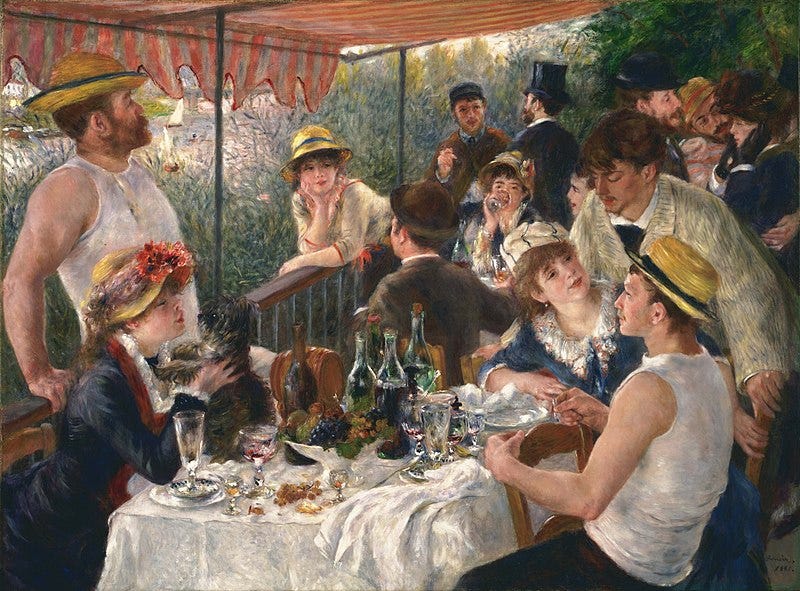Why I Don't Want Allies
And much prefer real friends
I’ve grown to have a strong negative reaction to the word “allies.” Though I’m sure it’s often used innocently enough, I can’t help but see it as a linguistic tool for control and forced teaming.
In modern woke progressive parlance, an ally is often someone from a more privileged group offering their support for a marginalized group. Whichever way you slice it, this dynamic often ends up leaving a bad taste in my mouth.
Sometimes, the “ally” treats those in the supposedly marginalized group in a patronizing and infantilizing manner. Think the typical “male feminist” or the bigotry of low expectations.
But other times, and I think more commonly nowadays, the privilege/oppressed dynamic becomes reversed, with the supposedly “oppressed” group having the upper hand over their supposedly “privileged” allies. Allies become relegated to the status of punching bags, expected to take the grievances of the oppressed group with a smile, and marked as failed allies if they don’t fill their role perfectly.
What comes to mind, for example, is how privileged white, cis, straight, male, [etc., etc.,] “allies” aren’t supposed to speak on a topic determined to be the sole domain of a particular oppressed group, but are supposed to always and in all circumstances acquiesce to the perspective of the oppressed position.
Now, there’s something to be said for people giving their unhelpful opinion on a topic that truly doesn’t affect them and that they have no personal experience with. They are allowed to do it, but it can be annoying depending on the circumstances.
However, this reasonable social rule of thumb is twisted within social justice circles and used as a means of silencing. For example, when women have to shut up and not voice concerns about men in their spaces because they have “cis privilege” and the men who want access to their spaces are “oppressed” because they are “trans.”
Or, consider a 2021 headline on toronto.com that proclaimed, “'Shut up and listen': Toronto’s LGBTQ2S+ community needs allies to hear and help them post-pandemic.”
So-called allies are expected to give of their time, money, and emotional energy but to otherwise be doormats.
Even when this type of privileged/oppressed dynamic doesn’t come into play, the concept of allyship is still something I struggle with.
In some cases, people view each other as mutual allies fighting on the same level for the same cause. Activist groups are a good example of this. But I think that forming groups on the basis of allyship rather than actual friendship is corrosive and will eventually lead to splintering.
While friendships can (or at least should) withstand differences of opinion, allyships cannot, at least not if on a topic that one or more people in the group consider crucial to the alliance. A preferred ideological mindset eventually begins to take hold of the group and, when someone missteps, even if they’ve done great work for “the cause,” they are accused of hypocrisy or betrayal.
In gender critical circles, for example, one can go from “ally” to “traitor” if they take an unfashionable stance on pronouns.
I don’t need or want these kinds of fair-weather allies. If people believe in a certain cause I also believe in and want to freely work together towards that goal—that’s wonderful. I generally don’t care what else they think or believe. Or, if I do find their views on a different issue to be abhorrent, then I will simply decide not to work with them but I won’t accuse them of being a bad ally or a traitor.
“Allyship” in this sense invokes control that I don’t want to have over anyone and I don’t want anyone to have over me. It invokes a sense of entitled loyalty without the actual friendship that should come along with real loyalty.
If my cause is actually a good one, then I want to fight for it alongside people who don’t need an often guilt-inducing label to fight for it with me. And I want to make friends with people who share a passion with me while showing them respect when we don’t see eye-to-eye.
I don’t want any kind of allies. I don’t want people who think they need to be my saviors, I don’t want people to act as my doormats, and I don’t want people I feel entitled to control. I’m happy to partner with people whose goals are aligned with mine and happy to part ways if they aren’t.
But most of all I want relationships that go beyond any sort of cause because people aren’t the means to an end, they are an end in and of themselves.
Or help support my work with a one-time donation through PayPal!


I love this, Eva! Brilliantly said and so true! When recognizing how and when and where we are being patronized, so much is revealed.
When I see the word "ally" in the context of today's culture wars, I immediately think of the online bullies who show up at most media outlets whenever I post gender critical comments. Those "allies" are not there to engage with facts or ideas. Instead they deliver personal insults or fall back on easily debunked talking points such as the WPATH guidelines being the "gold standard" of gender medicine.
There are worse allies that comment trolls. For example, content moderators who double as trans allies have the power to block or delete gender critical posts. As trans allies, writers and editors have even greater power still. A writer can confound readers by characterizing a ban on gender medicine as "anti-LGBTQ+ legislation" when in fact the law has no impact on sexual minorities such as gay men. To the ally at the editor's desk belongs the power to tell reporters not to quote sources who have strayed too far in the direction of apostasy in their views on gender.